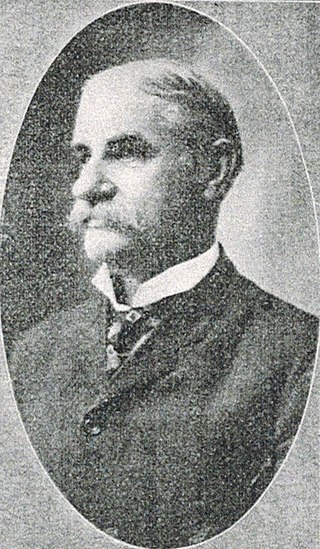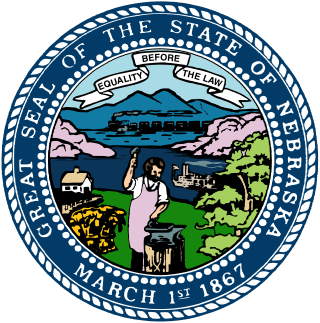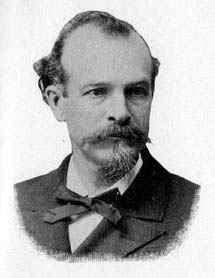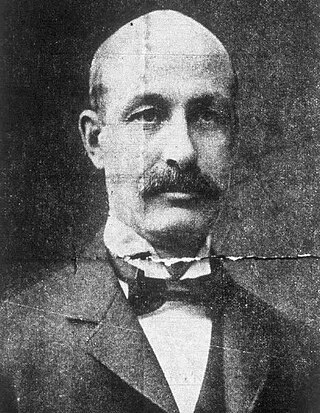
Presidential elections were held in the United States on November 4, 1884. Democratic Governor Grover Cleveland of New York narrowly defeated Republican James G. Blaine of Maine. It was set apart by mudslinging and personal allegations that eclipsed substantive issues, such as civil administration change. Cleveland was the first Democrat elected president of the United States since James Buchanan in 1856, the first to hold office since Andrew Johnson left the White House in 1869, and the last to hold office until Woodrow Wilson, who began his first term in 1913. For this reason, 1884 is a significant election in U.S. political history, marking an interruption in the era when Republicans largely controlled the presidency between Reconstruction and the Great Depression.

James Baird Weaver was an American politician in Iowa who was a member of the United States House of Representatives and two-time candidate for President of the United States. He belonged to several different political parties over the course of his political career. He joined the Republicans, opposed slavery, and served as an officer in the Union army during the civil war, but after 1876 he switched to the Greenbacks, then the Populists, and finally the Democrats. He trained as a lawyer. Late in his career he served as mayor of Colfax, Iowa. He wrote k, A Call to Action: An Interpretation of the Great Uprising, Its Source and Causes published in 1892 when he was a Populist Party candidate for the U.S. presidency, he later wrote a history of Jasper County, Iowa.

The 1884 New York state election was held on November 4, 1884, to elect two judges of the New York Court of Appeals, as well as all members of the New York State Assembly.

Hibbard Houston Shedd was an American politician who served as the fourth lieutenant governor of Nebraska from 1885 to 1889.

The 1884 Greenback Party National Convention assembled in English's Opera House in Indianapolis, Indiana. Delegates from 28 states and the District of Columbia were in attendance. The convention nominated Benjamin F. Butler for president over Party Chairman Jesse Harper on the first ballot. Absolom M. West was nominated unanimously for vice-president, and subsequently was also endorsed by the Anti-Monopoly Party.

The 1884 Michigan gubernatorial election was a state election held on November 4, 1884. Republican nominee Russell A. Alger defeated incumbent Josiah W. Begole, who ran on a fusion ticket, representing both the Democratic and Greenback, with 47.67% of the vote.

The 1883 Massachusetts gubernatorial election was held on November 6.

The 1900 Nebraska gubernatorial election was held on November 6, 1900.

The 1882 Nebraska gubernatorial election was held on November 7, 1882. Incumbent Republican governor Albinus Nance did not seek reelection. This election featured James W. Dawes, a Republican, defeating Democratic nominee J. Sterling Morton and Greenback nominee Edward P. Ingersoll.

The 1878 Nebraska lieutenant gubernatorial election was held on November 5, 1878, and featured Republican nominee Edmund C. Carns defeating Greenback and Democratic nominee Theron M. Blakely as well as the original Democratic nominee F. J. Mead who still received some votes. Originally, the Democratic party had nominated F. J. Mead for lieutenant governor. However, in late October 1878, the state central committees of the Democratic and Greenback parties met in Lincoln, Nebraska, and decided to replace F. J. Mead with Greenback candidate Theron M. Blakely on the ticket for lieutenant governor.

The 1880 Nebraska lieutenant gubernatorial election was held on November 2, 1880, and featured incumbent Nebraska Lieutenant Governor Edmund C. Carns, a Republican, defeating Democratic nominee T. J. Hamilton as well as Greenback nominee Peter Lansing and former Democratic nominee Samuel H. Calhoun. Originally, the Democratic party had nominated Calhoun for lieutenant governor. However, on October 11, 1880, Calhoun withdrew his candidacy, and the Democratic state central committee appointed T. J. Hamilton to replace him.

The 1882 Nebraska lieutenant gubernatorial election was held on November 7, 1882, and featured Republican nominee Alfred W. Agee defeating Democratic nominee Jesse F. Warner as well as Greenback nominee D. P. Reynolds.

The 1886 Nebraska lieutenant gubernatorial election was held on November 2, 1886, and featured incumbent Nebraska Lieutenant Governor Hibbard H. Shedd, a Republican, defeating Democratic nominee Charles J. Bowlby as well as Prohibition Party nominee E. B. Graham and National Union Party nominee M. K. Lewis.

The 1890 Nebraska lieutenant gubernatorial election was held on November 4, 1890, and featured Republican nominee Thomas Jefferson Majors defeating Populist nominee William H. Dech and Democratic nominee Alex Bear as well as Prohibition Party nominee George W. Woodbey. Incumbent Nebraska Lieutenant Governor George D. Meiklejohn did not seek reelection as lieutenant governor in order to seek the Republican nomination for the US House of Representatives in Nebraska's 3rd congressional district, but he was unsuccessful.

The 1894 Nebraska lieutenant gubernatorial election was held on November 6, 1894, and featured Republican nominee Robert E. Moore defeating Populist and Democratic fusion nominee James N. Gaffin as well as Straight Democratic (anti-Populist) nominee Rodney E. Dunphy and Prohibition Party nominee Belle G. Bigelow.

The 1896 Nebraska lieutenant gubernatorial election was held on November 3, 1896, and featured Populist and Democratic fusion nominee James E. Harris defeating his major rival, Republican nominee Orlando Tefft. Other candidates who received two percent of the vote or less included Gold Democratic nominee Owen F. Biglin, Prohibition nominee Lucius O. Jones, Socialist Labor nominee Fred Herman, and National Silver nominee Oscar Kent. Incumbent Nebraska Lieutenant Governor Robert E. Moore did not seek reelection.

The 1898 Nebraska lieutenant gubernatorial election was held on November 8, 1898, and featured Populist and Democratic fusion nominee Edward A. Gilbert defeating Republican nominee George A. Murphy as well as Prohibition nominee Newell S. Lowrie and Socialist Labor nominee J. J. Kerrigan.

The 1900 Nebraska lieutenant gubernatorial election was held on November 6, 1900, and featured Republican nominee Ezra P. Savage defeating incumbent Nebraska Lieutenant Governor Edward A. Gilbert, the Populist and Democratic fusion nominee. Other candidates who received two percent of the vote or less included Prohibition nominee Charles R. Lawson, Midroad Populist nominee Herman G. Reiter, and Social Democratic nominee David McKibben.

The 1904 Nebraska lieutenant gubernatorial election was held on November 8, 1904, and featured incumbent Nebraska Lieutenant Governor Edmund G. McGilton, a Republican, defeating Adelbert Townsend, the Populist and Democratic fusion nominee, as well as Prohibition nominee Isaiah Lightner and Socialist nominee Thomas Carroll.

The 1906 Nebraska lieutenant gubernatorial election was held on November 6, 1906, and featured Republican nominee Melville R. Hopewell, defeating William H. Green, the Democratic and Populist fusion nominee, as well as Prohibition nominee J. D. Forsythe and Socialist nominee C. A. Howe.
















